Trg Republike Hrvatske 14
Zagreb, Hrvatska
Jean Monnet and Common Market Law Review Launch Conference of the Common Market Law Review Extraordinary Issue
10 April 2026
IN PERSON PARTICIPATION ONLY. To participate, please register at: https://forms.gle/jwptw5eoafxJd4CK7. Registration is open until 2 March 2026.
Jean Monnet and Common Market Law Review conference programme
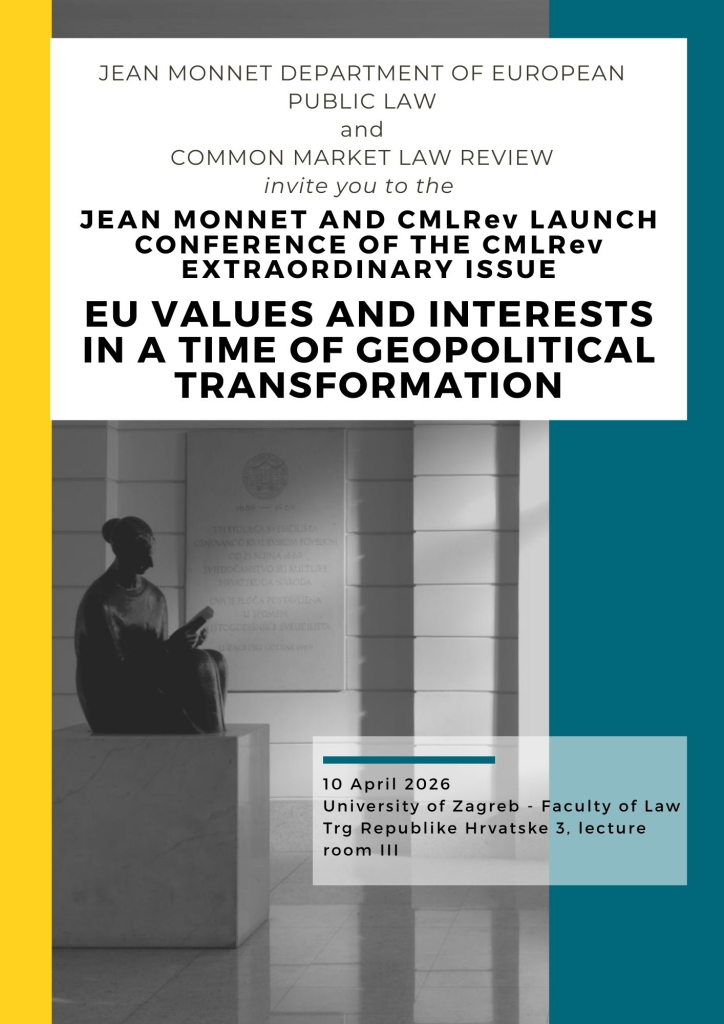
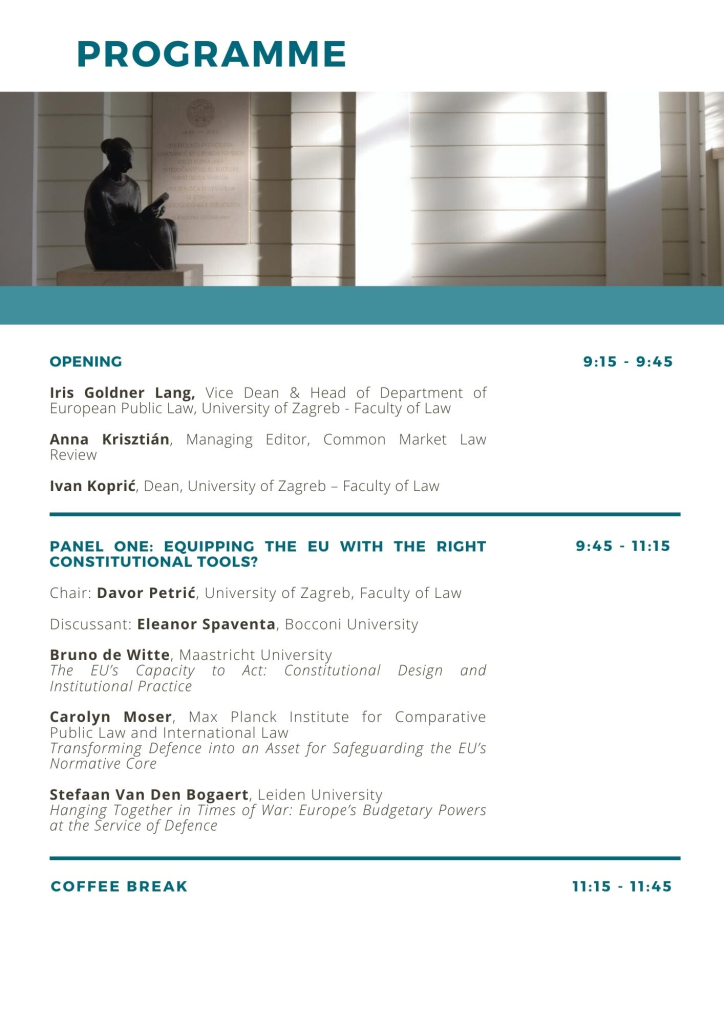
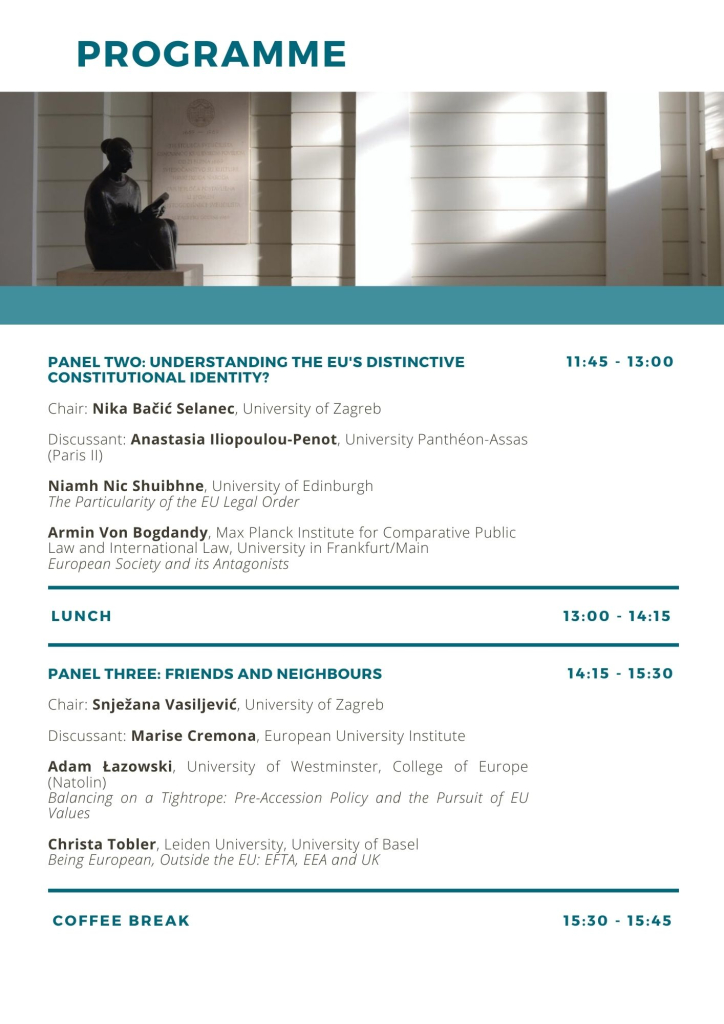
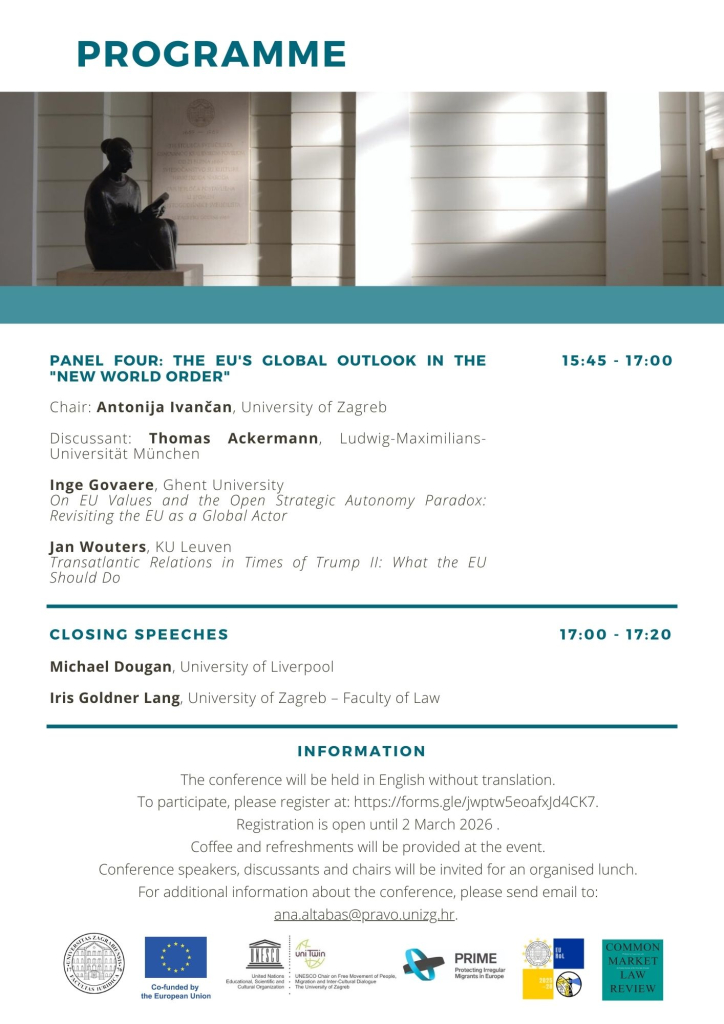
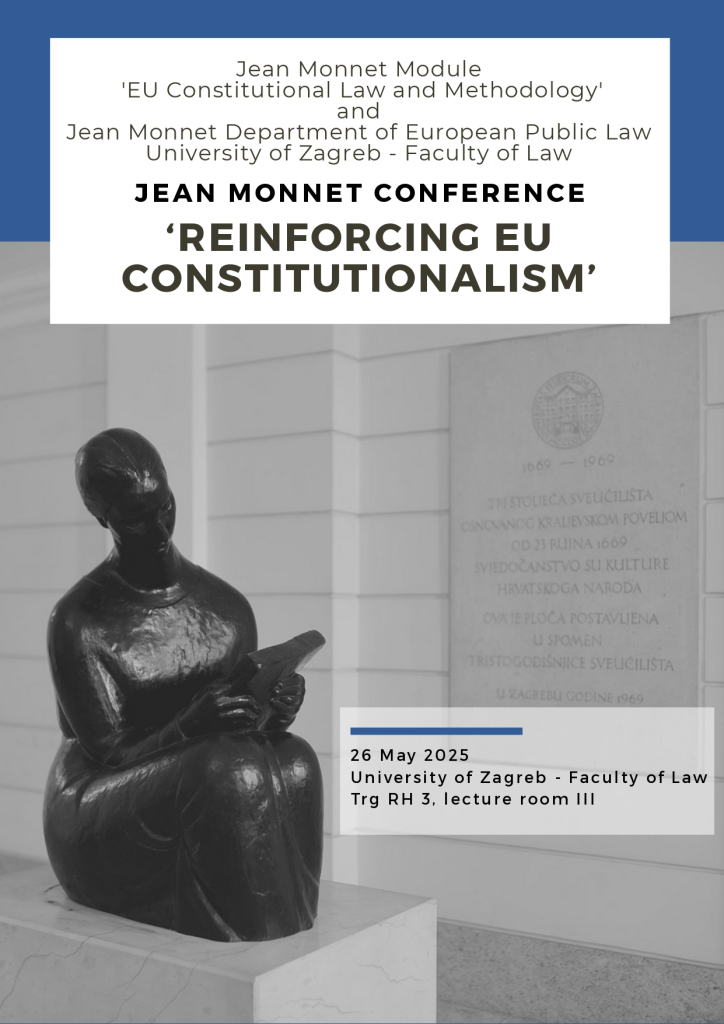
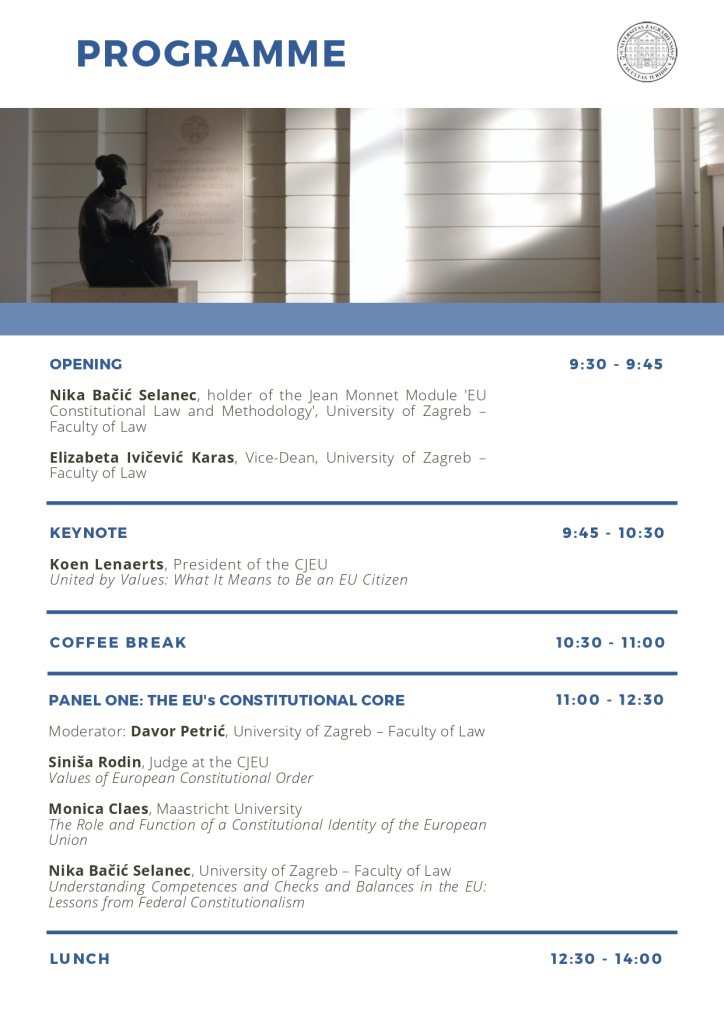
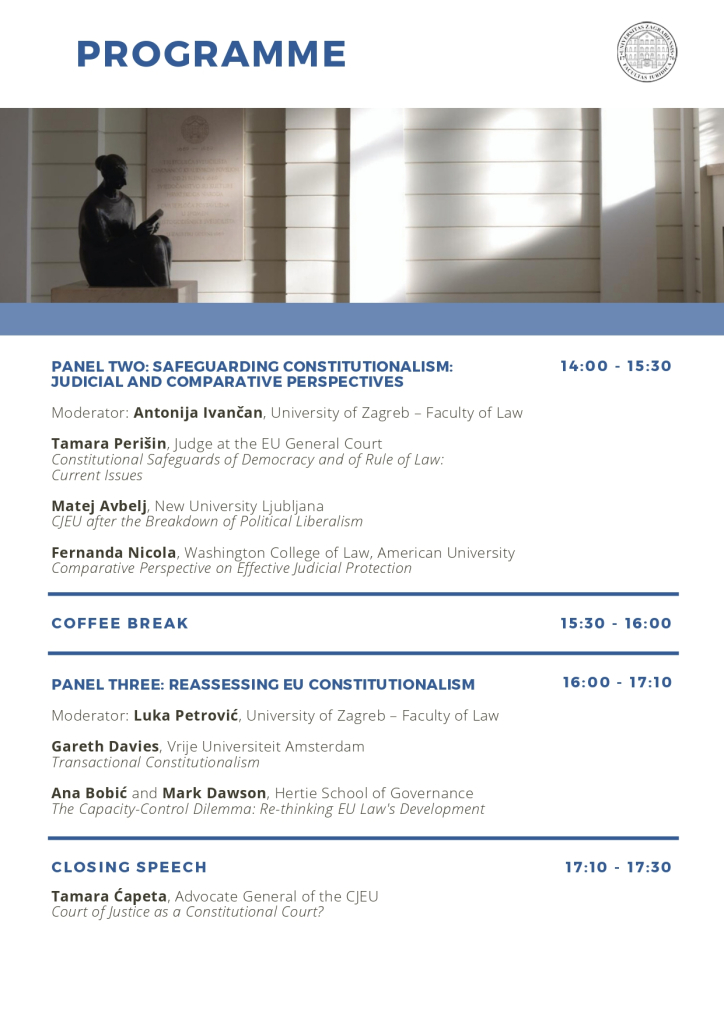
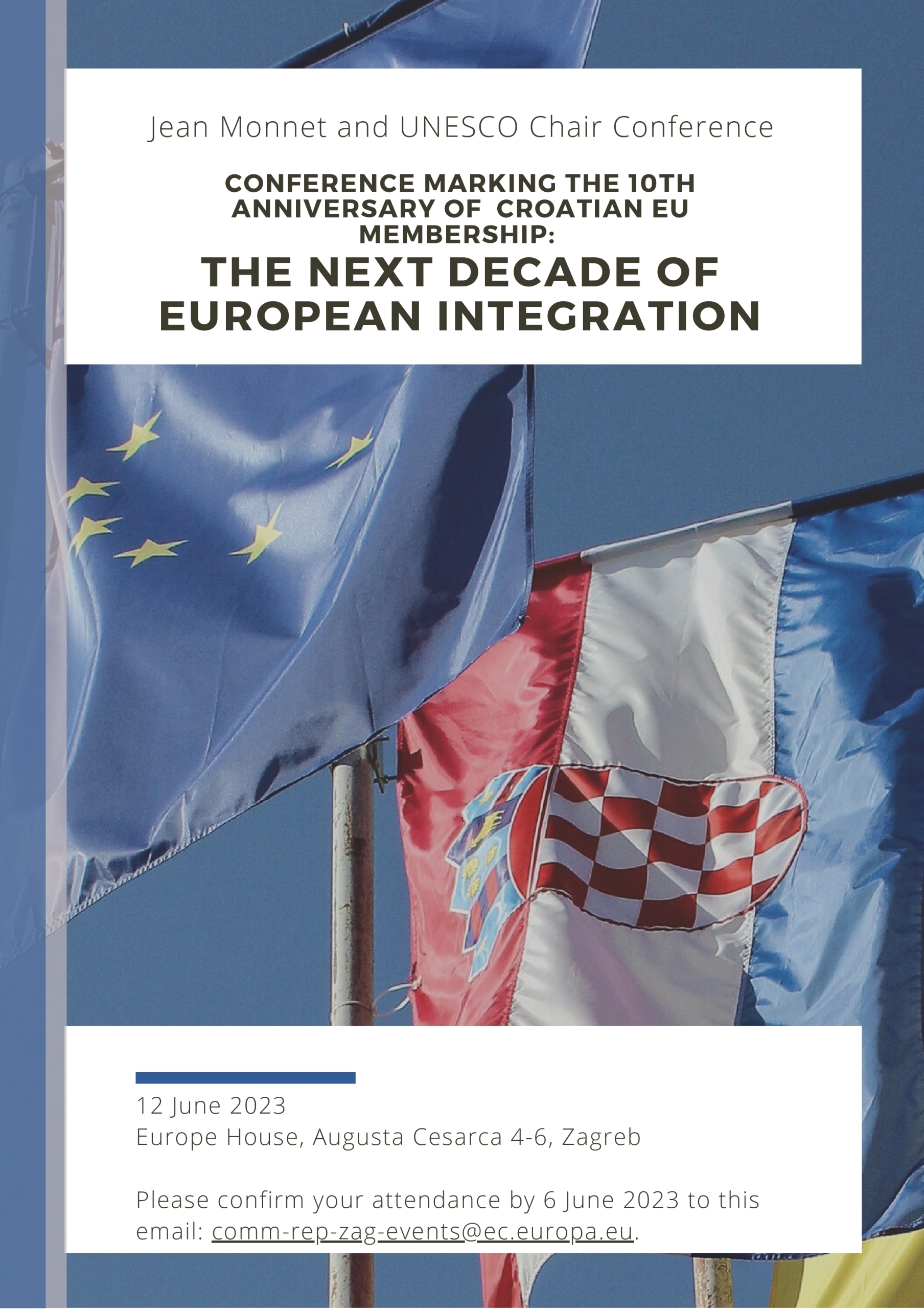
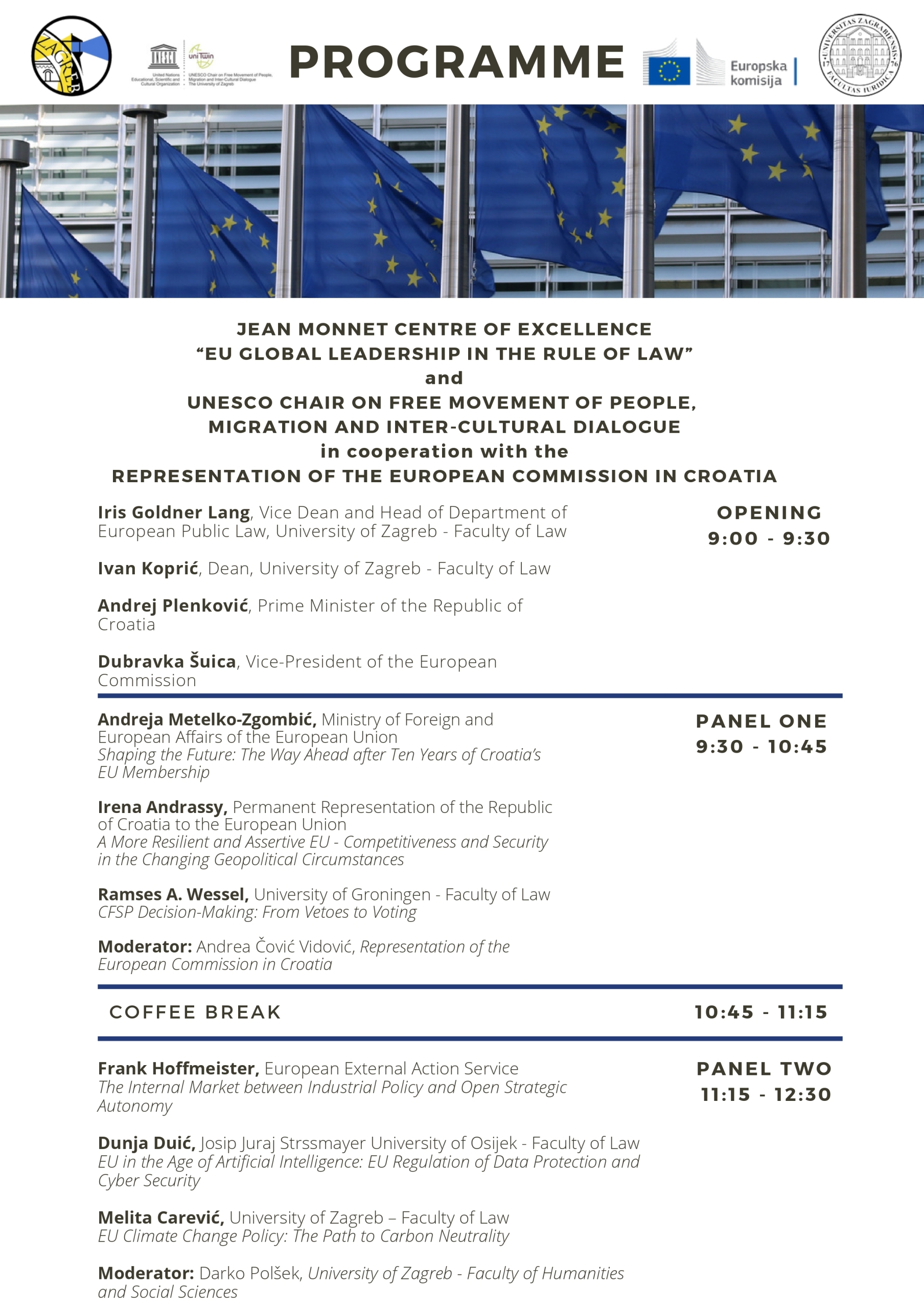
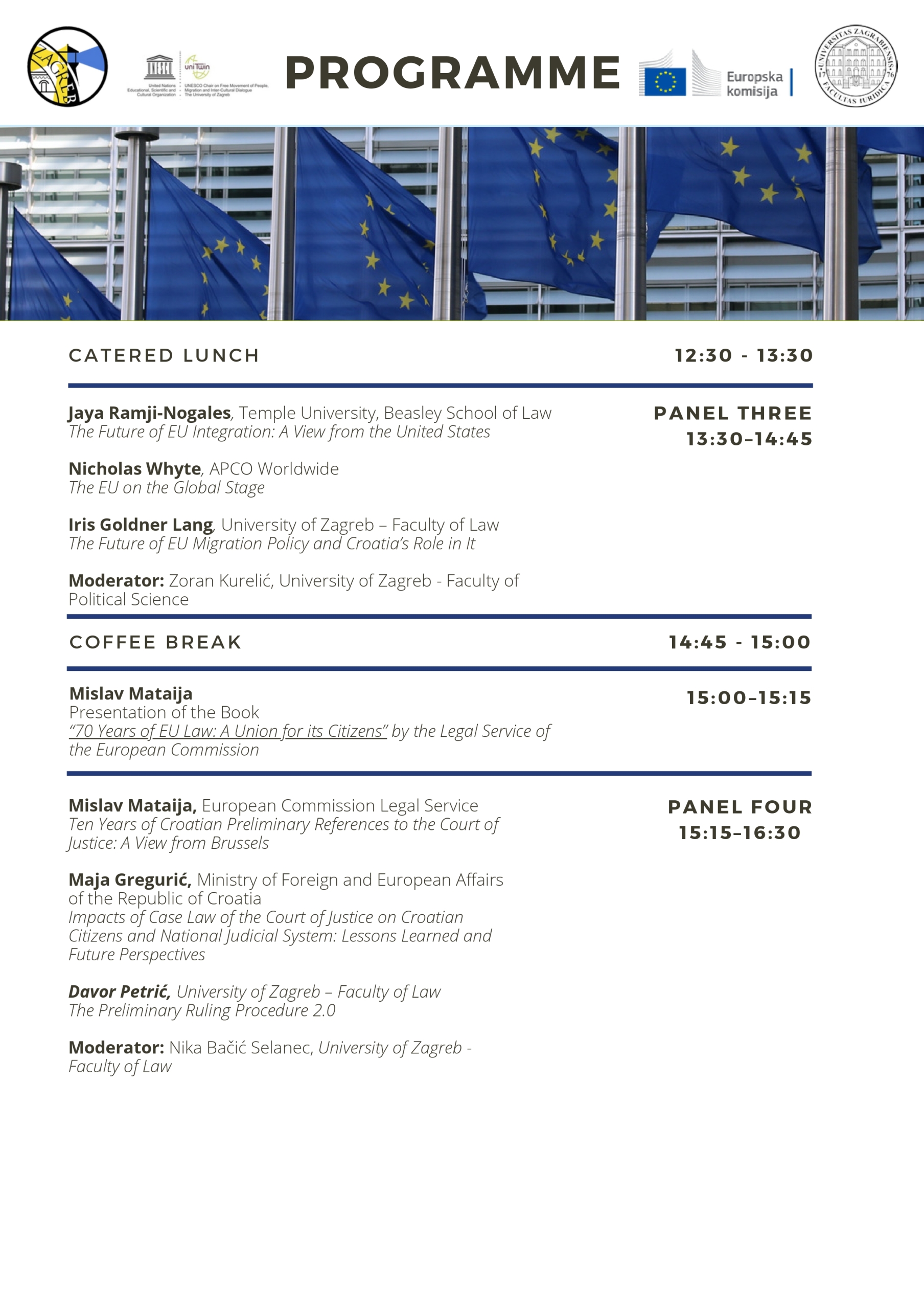
4th UNESCO Conference “Schengen and European Borders”
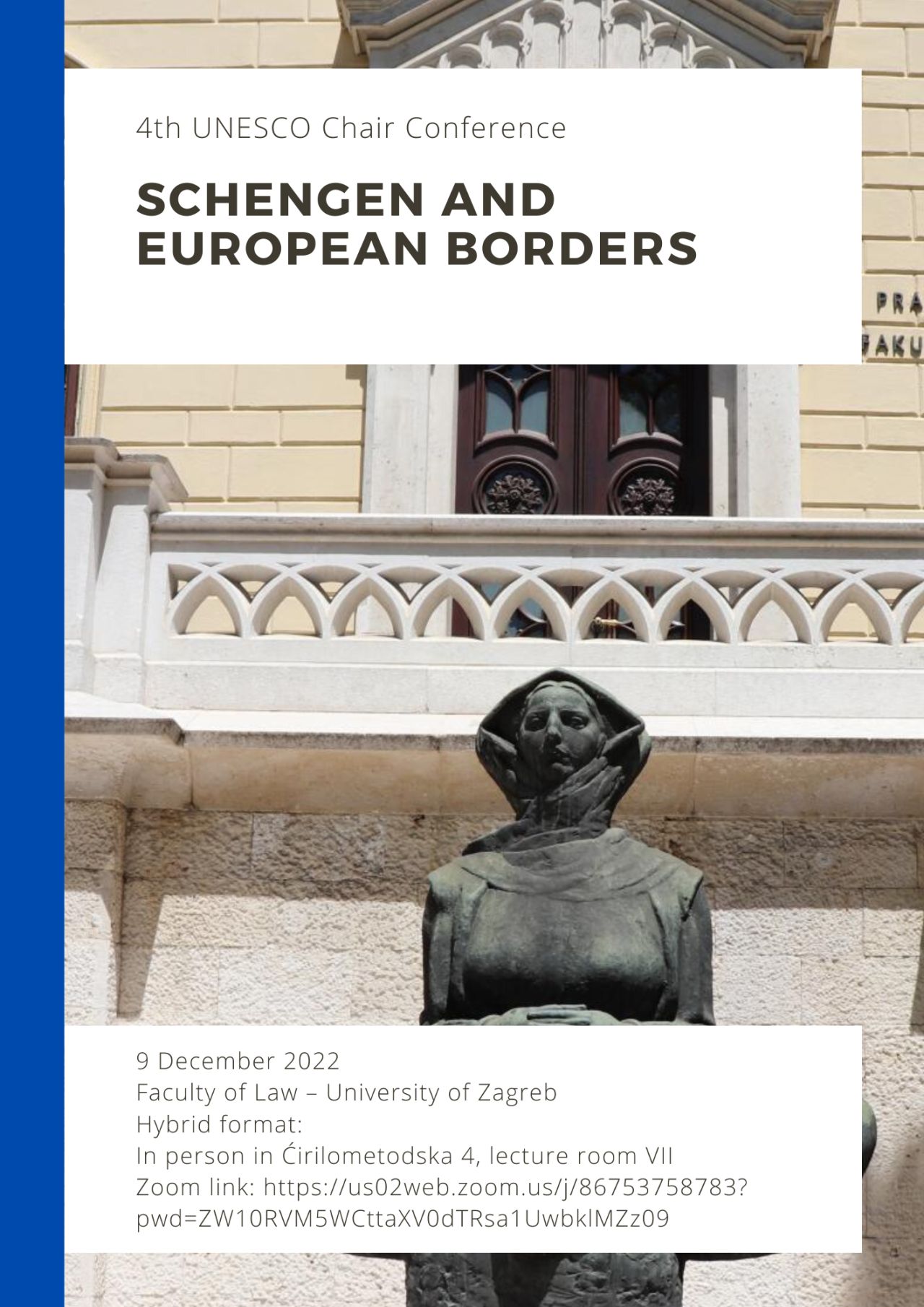
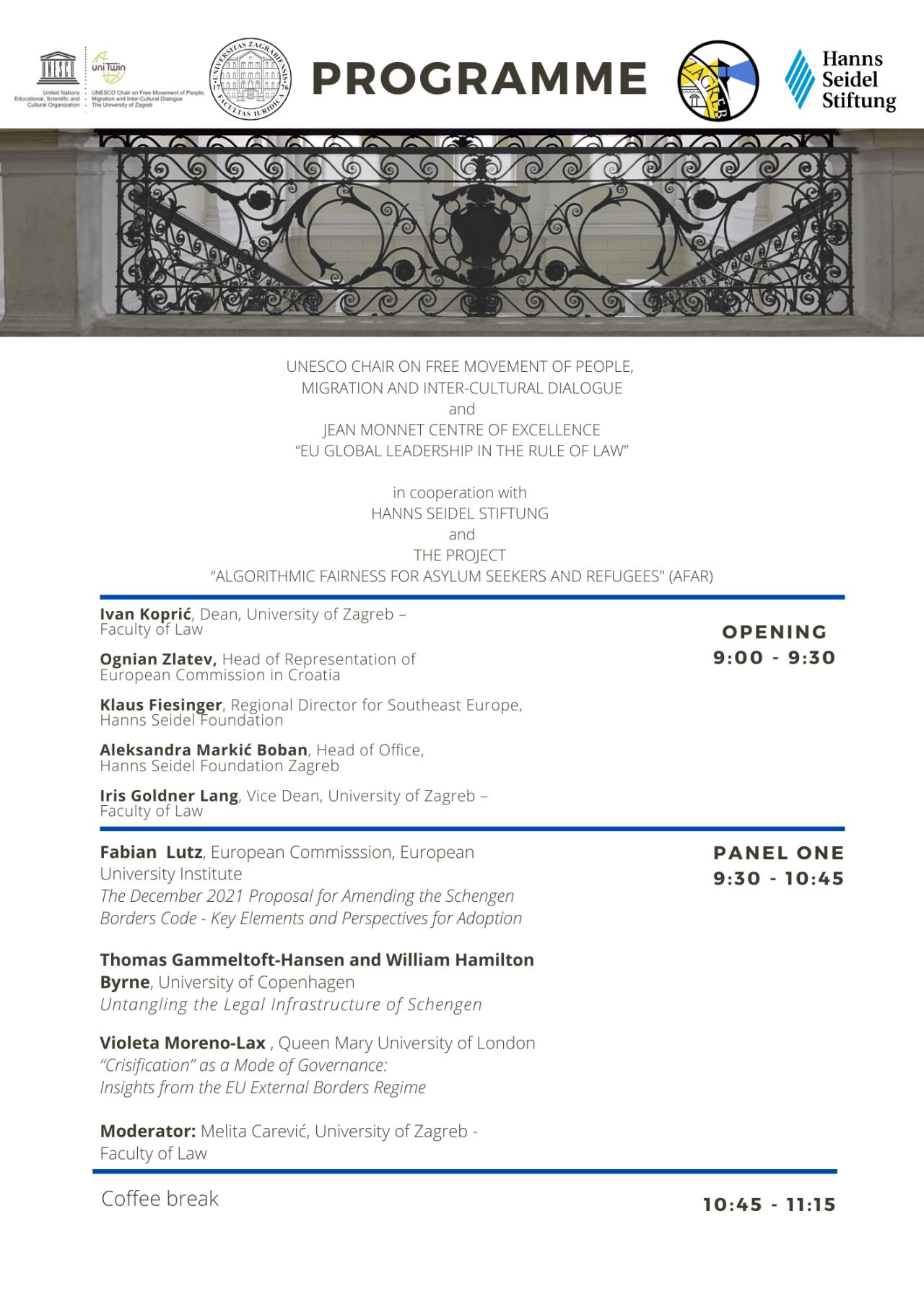
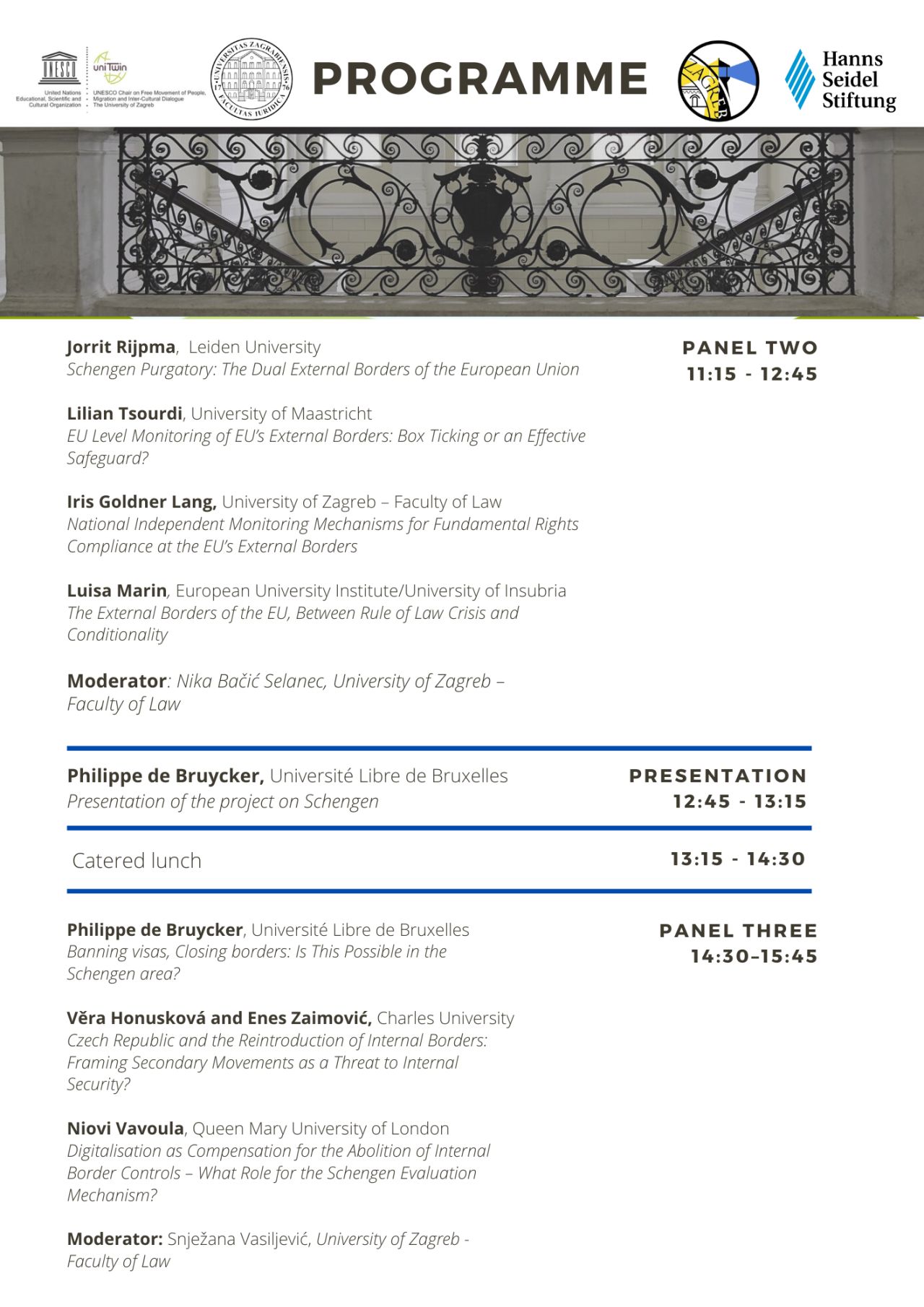
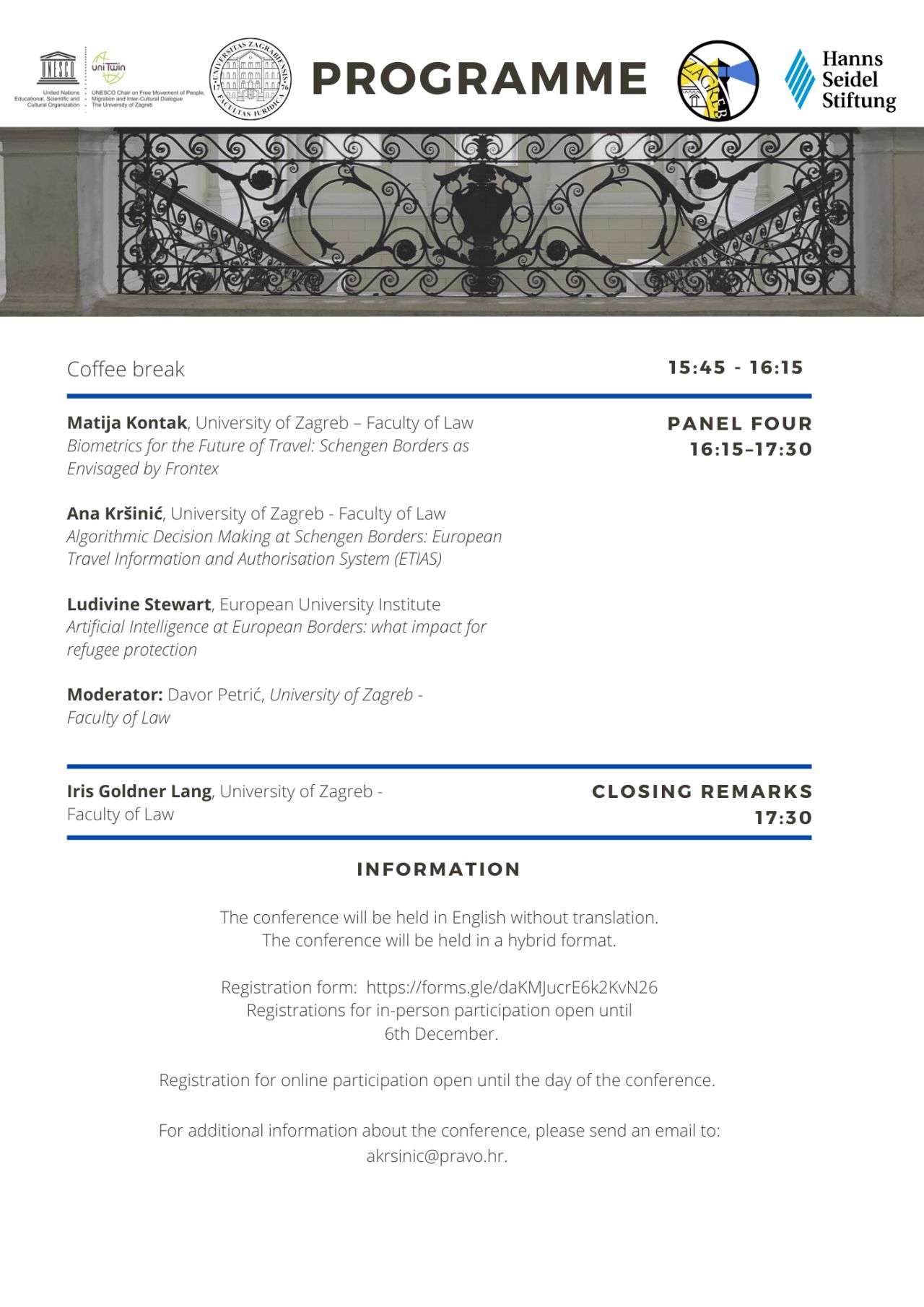
Registration form: https://forms.gle/daKMJucrE6k2KvN26
Link for Zoom: https://us02web.zoom.us/j/86753758783?pwd=ZW10RVM5WCttaXV0dTRsa1UwbklMZz09
Role of Courts and the Rule of Law in the European Union
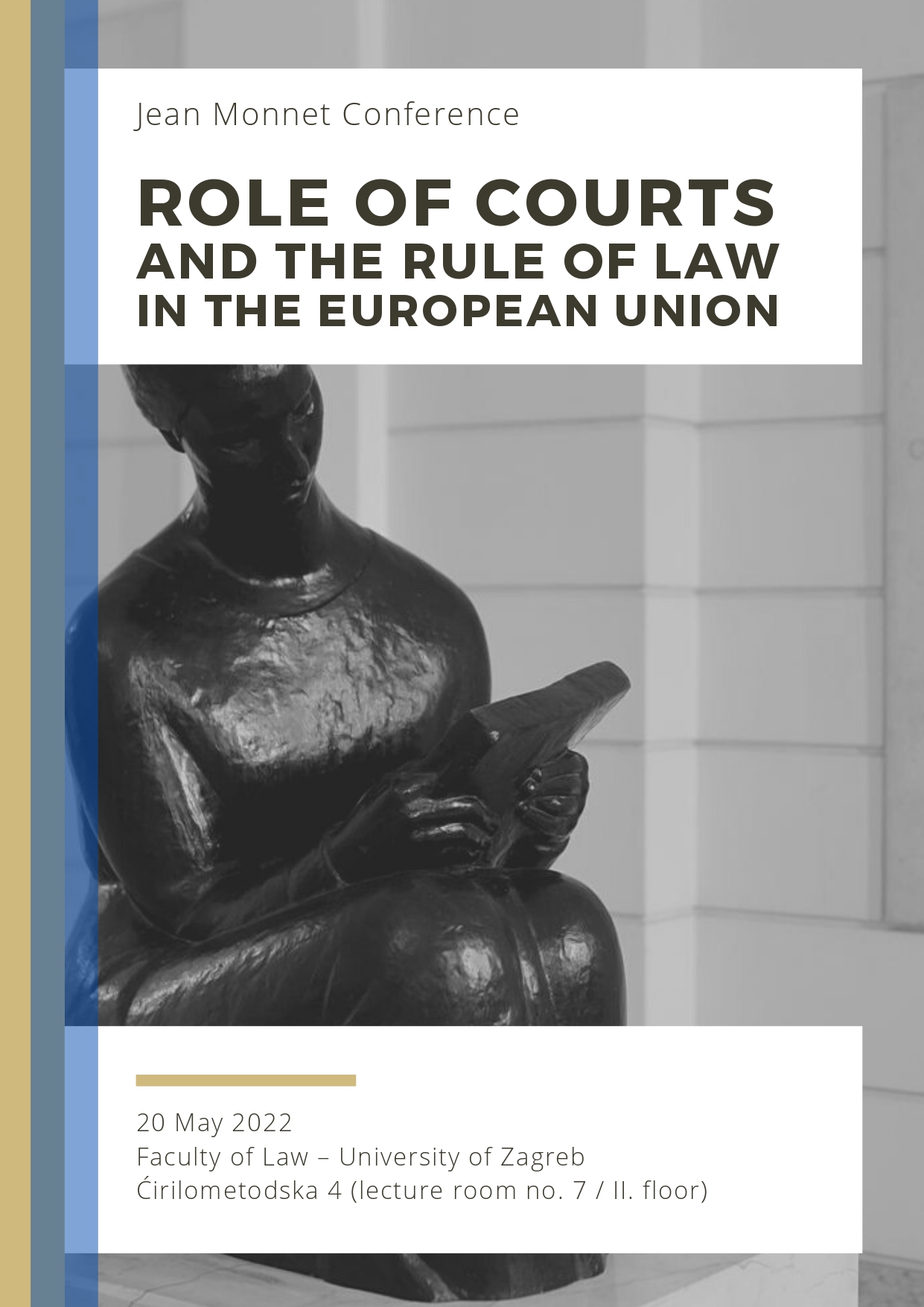
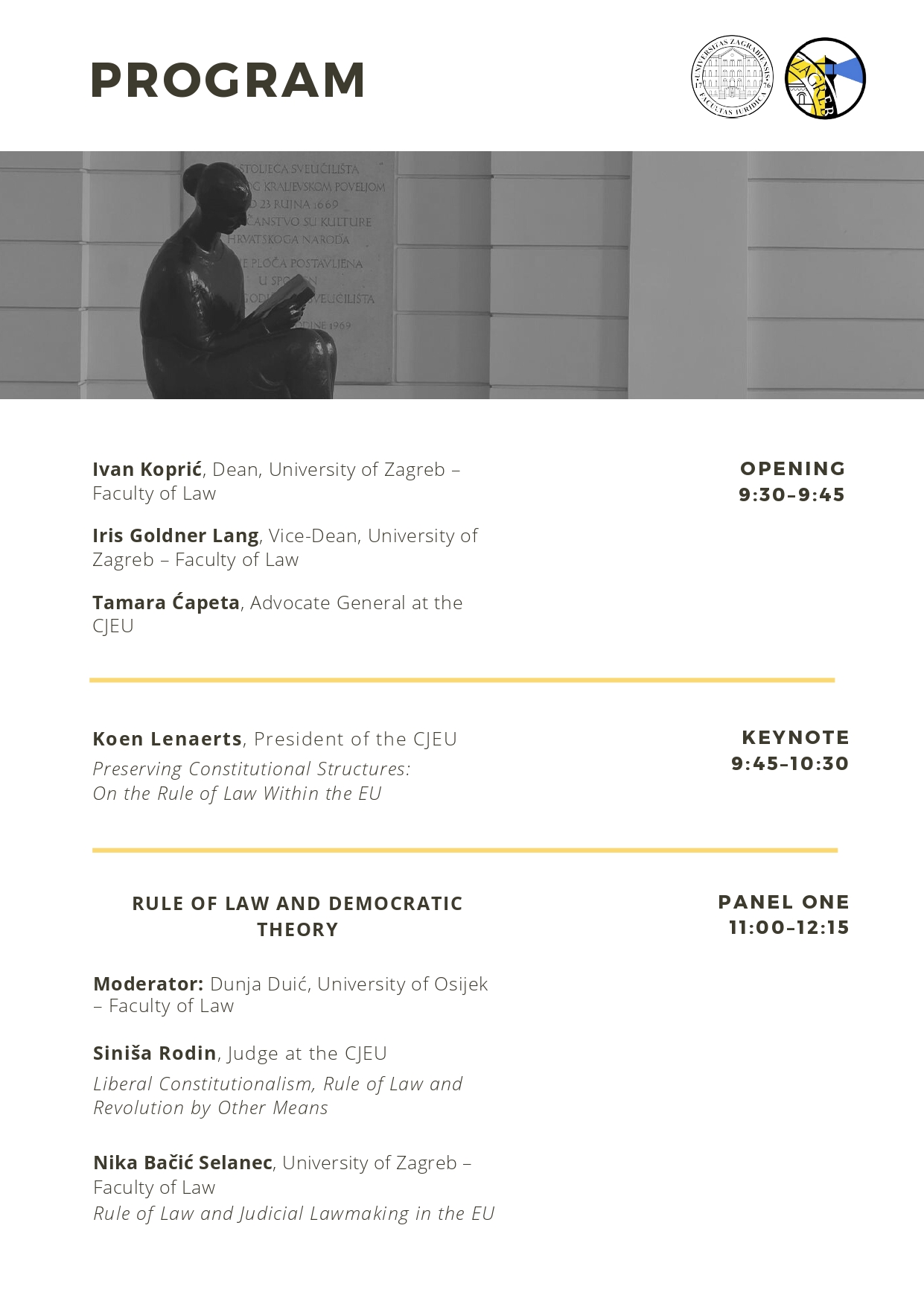
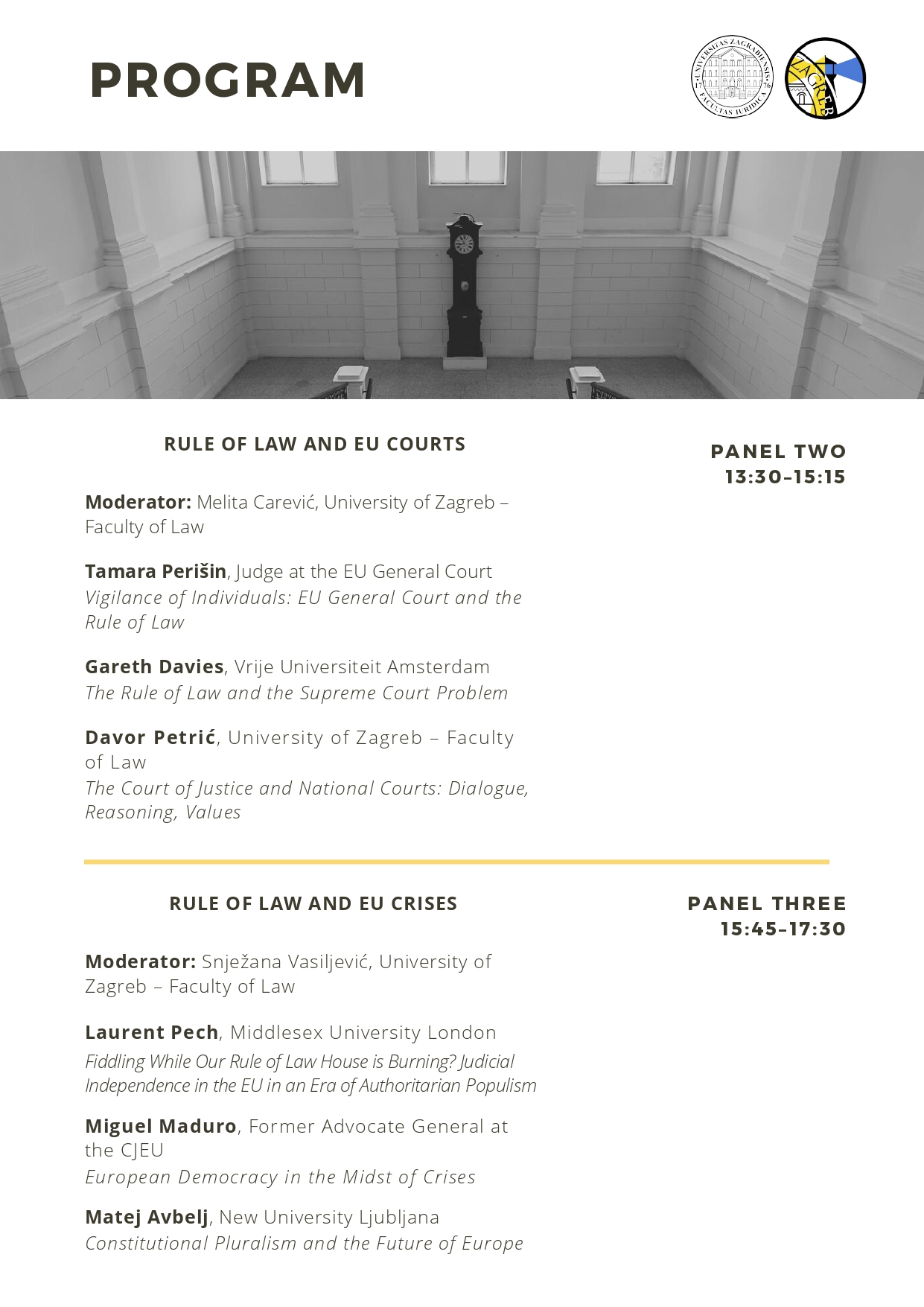
***
INFORMATION
The conference will be held in English without translation.
Attendance at the event is possible exclusively online.
Registration for online participation at the conference via the
following link: https://forms.gle/uf1z6ZK4hXUaTpfx9
For additional information about the conference, please send an email to:
nika.bacic@pravo.hr
3rd UNESCO Conference “Migration and the Rule of Law”

UNESCO Chair on Free Movement of People, Migration and Inter-Cultural Dialogue of the University of Zagreb
Jean Monnet Centre of Excellence “EU Global Leadership in the Rule of Law”, Faculty of Law – University of Zagreb
3rd UNESCO Conference
“Migration and the Rule of Law”
Date: Friday, January 17, 2020
Venue: Faculty of Law – University of Zagreb, Trg Republike Hrvatske 14, Council Hall (Vijećnica, second floor)
The conference will be held in English without translation.
Presentation abstracts and speakers’ biographies are available at the conference website:
https://www.pravo.unizg.hr/EJP/rule_of_law_and_migration
Conference program can also be downloaded here.
Please confirm your attendance by January 14, 2020, via the following link:
https://forms.gle/jerRuZsSw9eN8m3e8
For additional information about the conference, please send an email to dpetric@pravo.hr
CONFERENCE PROGRAM
08:30 – 09:00 Arrival and registration
09:00 – 09:20 Welcome speeches and presentation of the UNESCO Chair, the Jean Monnet Centre of Excellence, and the Croatian Yearbook of European Law and Policy
Iris Goldner Lang, University of Zagreb
Tamara Ćapeta, University of Zagreb
Igor Gliha, Dean of the Faculty of Law
Damir Boras, Rector of the University of Zagreb
09:20 – 11:00 Panel 1
Moderator: Tamara Ćapeta, University of Zagreb
Structural Deficits of the Supranational Integration Method in the Context of EU Migration Law
Daniel Thym, University of Konstanz
No Solidarity without Loyalty: Why Do Member States Violate EU Migration Law and What Can Be Done?
Iris Goldner Lang, University of Zagreb
Asylum, National Interest and the Rule of Law: The Implementation Gap in EU Asylum Law
Francesco Maiani, University of Lausanne
Arbitrary Deprivation of Liberty as a Migration Management Tool: Control Standards and Judicial Interaction in Europe
Lilian Tsourdi, Maastricht University
11:00 – 11:30 Coffee break
11:30 – 13:00 Panel 2
Moderator: Goranka Lalić Novak, University of Zagreb
The UN Global Compact for Safe, Orderly and Regular Migration: A New Turn for the Rule of Law and Migration Governance?
Vincent Chetail, The Graduate Institute of International and Development Studies, Geneva
Management of “Worlds in Motion”: Scrutinizing Global Compacts on Migration and Refugees
Drago Župarić-Iljić, University of Zagreb
The Role of the European Court of Human Rights in Protecting Refugees and Securing the Rule of Law
Ksenija Turković, European Court of Human Rights
13:00 – 14:00 Catered lunch
14:00 – 15:30 Panel 3
Moderator: Nika Bačić Selanec, University of Zagreb
Non-Refoulement Under the Trump Administration
Jaya Ramji-Nogales, Temple University
Fast-track Removals from the U.S. and the Need for Additional Safeguards
Sabrineh Ardalan, Harvard Law School
Refugees, Mobility and Rights
Moria Paz, Stanford & Georgetown
15:30 – 15:40 Short break
15:40 – 16:30 Concluding session
The New Migration Law and Its Implications for the Role of Law and the Rule of Law
Hiroshi Motomura, UCLA School of Law
Closing remarks
Sabrineh Ardalan, Harvard Law School
Fast-track Removals from the U.S. and the Need for Additional Safeguards
Abstract
In recent years, the majority of those deported from the United States each year are sent back to their home countries through summary procedures – without ever having a full hearing in front of an immigration judge. Bypassing the immigration court system, these summary deportation processes are improperly punitive and deny due process to individuals with legitimate claims to protection in the United States. This talk will provide an overview of recent policy changes that have led to an increase in fast-track deportations, the legal framework for these deportations, and case studies that highlight the impact of these summary procedures on asylum seekers.
Sabrineh Ardalan is clinical professor of law at Harvard Law School and assistant director of the Harvard Immigration and Refugee Clinical Program (HIRC). At HIRC, Ardalan supervises and trains law students working on applications for asylum and other humanitarian protections, as well as appellate litigation and policy advocacy. She has authored amicus briefs submitted to the Board of Immigration Appeals, as well as to the federal district courts, circuit courts of appeal, and the U.S. Supreme Court on cutting edge issues in immigration law. She also oversees and collaborates closely with the clinic’s social work staff. She teaches courses on immigration and refugee law, international labor migration, and on trauma, refugees, and the law. Prior to her work with the clinic, Ardalan clerked for Hon. Michael A. Chagares of the Third Circuit Court of Appeals and Hon. Raymond J. Dearie, district judge for the Eastern District of New York. She previously served as the Equal Justice America fellow at The Opportunity Agenda, where she worked on advocacy around a right to health care under U.S. and international law and as a litigation associate at Dewey Ballantine LLP. She holds a J.D. from Harvard Law School and a B.A. in history and international studies from Yale College.
Vincent Chetail, Graduate Institute of International Development Studies Geneva
The UN Global Compact for Safe, Orderly and Regular Migration: A New Turn for the Rule of Law and Migration Governance?
Abstract
The Global Compact for Safe, Orderly and Regular Migration (GCM) was endorsed by the United Nations General Assembly on 19 December 2018 to improve migration governance at both the international and domestic levels. One of its key features relies on the renewed commitment of states towards the rule of law. This notion is acknowledged as a guiding principle of the whole Compact and the ways to achieve it are further detailed in a broad range of measures agreed on by states. The presentation will assess the potential and the limits of the Global Compact to mainstream the rule of law in migration governance.
Vincent Chetail is Professor of International Law, Director of the Global Migration Centre and Chair of the International Law Department at the Graduate Institute of International Development Studies (Geneva). He has extensively published in the field of migration, including twenty books and over sixty articles, book chapters and reports. His most recent book is: International Migration Law (Oxford University Press, 2019). He regularly serves as a consultant to governments, NGOs and international organizations. He has been visiting scholar at Harvard Law School (2013) and King’s College London (2017) as well as visiting professor at several universities, such as Paris II Pantheon (2019), Queen Mary University (2018), Queen’s University of Belfast (2016), the European University Institute – Florence (2010), the University of Paris XI (2006-2012) and the Université libre de Bruxelles (2008-2012).
Iris Goldner Lang, University of Zagreb
No Solidarity without Loyalty: Why Do Member States Violate EU Migration Law and What Can Be Done?
Abstract
The aim of this presentation is twofold. First, it will display an ever-increasing phenomenon of Member States’ infringements of EU migration and asylum law as an instance of the violation of the principle of solidarity and discuss the reasons behind it. It will be suggested that EU inter-state solidarity is just as much about respecting EU law, as it is about helping each other, as the latter cannot subsist without the former. Second, it will be considered whether the existing mechanisms of reducing the number of violations are sufficient and whether the new mechanisms that are being developed – particularly the rule of law conditionality and other conditionality instruments – are going to change this. Two groups of reasons behind the frequent violations will be identified, the first group being applicable to the whole of EU law, and the second one specifically to EU migration and asylum law. In this context, Member States’ violations will be construed as the process of political withdrawal or retrenchment from certain parts of the commonly adopted EU migration and asylum law. This will be explained by relying on the notion of “spillback” or disintegration (as opposed to further European integration based on the neofunctionalist concept of “spillover” effect into more policy areas) and on the concepts of “exit” and “voice” conceived by Albert Hirschman and developed further by Joseph Weiler in his seminal work “The Transformation of Europe”.
Iris Goldner Lang is a Jean Monnet professor of EU law and holder of the UNESCO Chair on Free Movement of People, Migration and Inter-Cultural Dialogue at the University of Zagreb. She works at the Department of European Public Law, which she chaired from 2013 until 2015. She was a John Harvey Gregory Visiting Professor of Law and World Organization and a Fulbright Visiting Researcher at Harvard Law School in 2015/2016. Professor Goldner Lang was a Visiting Researcher at UCL (summer 2017) and Harvard Law School (summer 2018), where she held a series of lectures at Harvard Immigration and Refugee Clinic. She was also an invited lecturer at the Court of Justice of the EU, European Parliament, LSE, University of Stockholm, University of Vienna, University of Lisbon, Vrije Universiteit Brussels, Alpbach Forum Summer School, Boston University, Temple University, etc. She is one of the academic coordinators of the Jean Monnet Centre of Excellence ‘EU’s Global Leadership in the Rule of Law’. She has been the leader of two Jean Monnet Modules on ‘EU Migration Law and Policy’ and ‘EU Internal Market Law’. She is the president of the Croatian Society for European Law (FIDE branch) and the Croatian representative in the Odysseus Academic Network for Legal Studies on Immigration and Asylum in Europe. She is editor-in-chief of the Croatian Yearbook of European Law and Policy.
Francesco Maiani, University of Laussane
Asylum, National Interest and the Rule of Law: The Implementation Gap in EU Asylum Law
Abstract
The asylum crisis of 2015-6, and later developments related to the fight against ’secondary movements’ of protection seekers, have cruelly exposed the existing implementation gap in EU Asylum Law. In the name of national interests, several Member States have initiated and maintained practices that circumvent – or at times openly flout – existing EU standards. In this presentation, this phenomenon will be examined and possible causes and remedies explored.
Francesco Maiani is Associate Professor of European Law at the University of Lausanne. His research interests include the Law of European Integration, International Human Rights and Refugee Law, as well as EU Migration Law and Policies. He teaches EU Law and is regularly invited to teach subjects of Migration Law. Born in Rome in 1974, he is the holder of a Degree in Law (University of Rome La Sapienza), of an LL.M. in European and International Economic Law (Universities of Geneva and Lausanne), and of a PhD in Law (Universities of Lausanne and Milano Statale). He is a former Max Weber Fellow at the European University Institute of Florence (EUI, 2007-2008), a Visiting Fellow at the Migration Policy Centre of the EUI (2015-2016) and a member of the ODYSSEUS Academic Network for Legal Studies on Immigration and Asylum in Europe.
Hiroshi Motomura, UCLA School of Law
The New Migration Law and Its Implications for the Role of Law and the Rule of Law
Abstract
Migration law is at a crossroads. Government responses have been inadequate for migrants and the countries involved. To explore this state of things, and to suggest solutions, I ask four questions. The first asks about the promise and the limits of nation-centered justice (for example, the civil rights movement in the United States) to address migration. The second asks about the relationship between immigration law and refugee protection. These two inquiries reveal the persistence of 20th century responses to 20th century migration. To suggest a new migration law, the third inquiry explores regional initiatives that address migration more comprehensively. Economic development aid for source and transit countries may influence international migration, but the promise and pitfalls of that influence are uncertain. Also unclear is the role of law in this domain, where ad hoc political arrangements, not legal rules, have dominated. The fourth question explores economic inequality in destination countries as a determinant of migration politics. Each of these inquiries is dauntingly broad, and efforts to connect them are rare. But it is essential to explore them and how they influence each other as a first step toward the best responses to migration in the 21st century. This perspective on the role of law and the rule of law in addressing migration suggests ways to connect the papers in this conference to each other.
Hiroshi Motomura is the Susan Westerberg Prager Distinguished Professor of Law at the University of California, Los Angeles (UCLA) and an influential scholar and teacher of United States immigration and citizenship. He has written two general audience books: Americans in Waiting (2006) and Immigration Outside the Law (2014). Both won the PROSE Award from the Association of American Publishers as that year’s best book in Law and Legal Studies, and the U.S. Department of State chose Americans in Waiting for its Suggested Reading List for Foreign Service Officers. Hiroshi is also a co-author of two law school casebooks: Immigration and Citizenship: Process and Policy (8th ed. 2016) and Forced Migration: Law and Policy (2nd ed. 2013). His scholarship has shaped the development of immigration law and policy in several key areas, including the adoption of Deferred Action for Childhood Arrivals (DACA) and the setting of limits on immigration detention. The recipient of many teaching honors, including the UCLA Distinguished Teaching Award in 2014, and one of 26 law professors nationwide profiled in What the Best Law Teachers Do (2013), he is now at work on a new book, The New Migration Law, with the support of a Guggenheim Fellowship.
Moria Paz, Stanford Law School, Center on National Security and the Law at Georgetown
Refugees, Mobility and Rights
Abstract
Today, we are witnessing a massive crisis of refugees. But our response is hindered by use of the term “refugee”, in public discourse and legal practice, as if it refers to a single and coherent set of legal claims. In fact, however, there are two separate types of claims that refugees make on the law, with crucial functional differences. The first are claims that are based in continuity and concern the legal status of individuals for whom changes in sovereignty destabilizes citizenship in their “own country”. The second are claims based in entry, and deal with the status of those individuals who have fled their “own country” because it is the source of their harm. Drawing on the genealogy of human rights law, I show that the law developed primarily to address only the continuity-based claims, and not claims based on entry. As a result, our laws are ill-equipped to address such refugee claims. A more effective approach would distinguish between these two different types of claims and address each appropriately. This is a question of life and death for millions.
Moria Paz is a legal researcher focusing on international law, human rights, refugee and migrant rights, and security. She is a Fellow at Stanford Law School and the Center on National Security and the Law at Georgetown. Her books include The Failed Promise of Language Rights (Éditions Universitaires Européennes, 2017), and The Law of Strangers: Jewish Lawyers and International Law in the Twentieth Century (Cambridge University Press, 2019). She is now completing a third manuscript, Network or State? International Law and the History of Jewish Self-Determination (Oxford University Press, 2020 forthcoming), and has begun work on a fourth book which examines the legal regime facing refugees in the Middle East and North Africa. Her work has been recognized through the Sakıp Sabancı International Research Awards (2019); the Law & Humanities Interdisciplinary Writing Competition (2014); New Voices for the American Society of International Law (2013); and the Laylin Prize for Best Paper in International Law (2007). Her paper, Between the Kingdom and the Desert Sun: Human Rights, Immigration, and Border Walls, was listed as one of the best works of recent scholarship relating to immigration law. Paz was selected to present at the New Voices Panel of the American Society of International Law (2013); the Junior Faculty Forum for International Law (2013); American Society of International Law Research Forum in 2012, 2016 and 2019. The Berkeley Journal of International Law organized a special panel around her paper, Between the Kingdom and the Desert Sun: Human Rights, Immigration, and Border Walls (2015). Finally, she was a speaker in one of the Andrew W. Mellon Foundation Sawyer Seminar’s Public Lectures Series in Global Language Justice. Paz received her S.J.D. doctoral degree from Harvard Law School. While at Harvard, she was awarded a number of fellowships, including at the Hauser Center for Non-Profit Organizations, The European Law Research Center, and the Weatherhead Center for International Affairs. Before Harvard, she attended The University of London, School of Oriental and African Studies (SOAS) and Beijing Normal University.
Jaya Ramji-Nogales, Temple University
Non-Refoulement Under the Trump Administration
Abstract
Over the past year, the Trump administration has issued a variety of proclamations and orders limiting access to the U.S. asylum process. Each of those government-imposed legal restrictions has been challenged in the federal courts. This talk will focus on three specific and interrelated changes to the U.S. asylum system that have been litigated since late 2018: the administration’s bar on asylum applications from migrants who cross the border between ports of entry; its policy requiring asylum seekers to remain in Mexico pending their asylum hearing; and its asylum ban for applicants at the southwest border who have passed through a third country without lodging an asylum claim. The talk will then consider the role of one of the most widely adopted and broadly binding rules of international human rights law – the principle of non-refoulement – in ensuring that the rule of law is upheld with respect to access to the asylum process. At first glance, the Trump administration’s restrictions on the asylum process might appear to signal a death knell for non-refoulement. However, a closer exploration reveals that despite the Trump administration’s misinterpretations of international law, both the executive branch and the federal judiciary have engaged seriously with the non-refoulement principle. It remains to be seen whether the federal courts will use this opportunity to turn soft law around non-refoulement into binding domestic law.
Jaya Ramji-Nogales is Associate Dean for Academic Affairs and the I. Herman Stern Research Professor at Temple University’s Beasley School of Law. She is the co-author, with Profs. Andrew I. Schoenholtz and Philip G. Schrag, of Refugee Roulette: Disparities in Asylum Adjudication and Proposals for Reform, an empirical study of adjudication at all four levels of the US asylum system, and Lives in the Balance: Asylum Adjudication by the Department of Homeland Security, a quantitative and qualitative study of asylum adjudication before the Department of Homeland Security’s Asylum Offices. Her current work seeks to generate conversations around the concept of global migration law, including a symposium in the American Journal of International Law Unbound. Prof. Ramji-Nogales’ current works examine refugee law under the Trump administration, the first a comparative look, with co-author Tally Kritzman-Amir, at nationality bans in Israel and the United States, and the second an evaluation of refugee rhetoric in the United States since the Refugee Act of 1980. Her recent publications uncover the role of international law in constructing migration emergencies and critique human rights law as insufficiently attentive to the interests of undocumented migrants. Prof. Ramji-Nogales has also authored articles on the situation of forced migrants under international criminal law and international humanitarian law, as well as on regional migration law in Southeast Asia.
Daniel Thym, University of Konstanz
Structural Deficits of the Supranational Integration Method in the Context of EU Migration Law
Abstract
Events during 2015 and early 2016 revealed structural deficiencies at the heart of the EU’s asylum policy which allow us to reconstruct the ‘refugee crisis’ as a problem of integration through law. The analysis of systemic shortcomings and underlying explanations highlights regulatory and political pitfalls which any attempt to overcome the crisis will have to confront. It will be shown that the EU institutions have to reform both legal rules and governance structures – a challenge the recent reform proposals have started addressing. Yet the ‘refugee crisis’ is about more than legal design and compliance: asylum policy shows that the EU must be careful not to get trapped in a vicious circle of output deficits and political contestation, which complicates the resolution of existing governance deficits.
Daniel Thym holds the Jean Monnet Chair of European, International and Public Law at the University of Konstanz and is a managing director of the Research Centre ‘Immigration & Asylum Law’ at the same university. Previously he worked for the Walter Hallstein Institute for European Constitutional Law at the Humboldt-University in Berlin. He serves as an editor of the European Law Journal and is a principal investigator of the Cluster of Excellence ‘Cultural Foundations of Social Integration’ at the University of Konstanz. Daniel Thym regularly appears as an expert witness in the home affairs committee of the German Bundestag, contributes to the pan-European ‘Odysseus Academic Network’ of legal experts in immigration and asylum law, and has published widely on diverse issues of European law, with a special focus on immigration, citizenship, asylum, constitutional affairs and external relations.
Lilian Tsourdi, Maastricht University
Arbitrary Deprivation of Liberty as a Migration Management Tool: Control Standards and Judicial Interaction in Europe
Abstract
The use of generalised detention as a migration management tool and the abuse of alternatives to immigration (asylum and pre-return) detention as a widespread control measure, in both the return and asylum frameworks, is undoubtedly on the rise in the EU. Against this backdrop, I critically analyse supranational control standards and judicial interaction within a heterarchy. I trace the links between the obligation to examine alternatives to detention, the concept of arbitrariness of deprivation of liberty, and vulnerability. I reflect on the role played by the principles of necessity and proportionality. I thus ascertain the role of international human rights ‘judges’ in controlling immigration detention and the extent to which they are interacting with each other in this process. I then comment on the impact of international human rights ‘judges’ on EU legislation and map the fragmented legal environment which national judges face. I next turn to the interaction between the CJEU and the ECtHR on immigration detention. I conclude that despite the reality of a fragmented legal environment, all legal regimes converge (albeit through different routes) to an ‘inviolable core’ of the right to liberty which should inform detention decision-making in the EU.
Evangelia (Lilian) Tsourdi is an Assistant Professor and Dutch Research Council grantee at the Law Faculty of Maastricht University, as well as a visiting professor at Sciences Po Paris. She is a member of the coordination team of the Academic Network for Legal Studies on Immigration and Asylum in Europe, the ‘Odysseus Network’. Lilian was previously a Departmental Lecturer in International Human Rights and Refugee Law at the Refugee Studies Centre of the University of Oxford; a Max Weber Fellow at the Law Faculty of the European University Institute (EUI) in Florence; a researcher at the Migration Policy Centre of the EUI, the Institute for European Studies of the Université libre de Bruxelles (ULB), and the Centre Charles De Visscher for International and European Law of UC Louvain; as well as an advisor for a Member of the European Parliament. She obtained her PhD from the Law Faculty and the Institute for European Studies of the ULB. She has published her research widely in important publishing houses and journals (e.g. Human Rights Law Review, Common Market Law Review). Her monograph on the constitutional foundations and administrative governance of the EU asylum policy is forthcoming in Oxford University Press.
Ksenija Turković, European Court of Human Rights
The Role of the European Court of Human Rights in Protecting Refugees and Securing the Rule of Law
Abstract
TO BE ADDED
Ksenija Turković is Croatian Judge at the European Court of Human Rights since 2013; President of Section since 2019. Obtained dipl. jur. degree from the Faculty of Law, University of Zagreb; Master of Laws (LL.M.) degree and Doctor of Juristic Science (J.S.D.) degree from the Yale Law School. Admitted to the New York State Bar in 1996. Worked as an Associate in General Corporate Practice, Sullivan & Cromwell (New York), and as a Legal Counsel for Hunton & Williams (New York) in a case before the International Criminal Tribunal for the former Yugoslavia (ICTY) in The Hague. Visiting Scholar at the Yale Law School (2002-2003). Full Professor of Criminal Law at the Faculty of Law, University of Zagreb, where she acted as Associate Dean for Academic and Student Affairs (2005-2007) and Head of Criminal Law Department (2008-2010). Also served as Vice-Rector of the University of Zagreb (2008-2012). Held expert positions in the Council of Europe’s Committee of Experts on the Protection of Children against Sexual Exploitation and Abuse (Vice-president, 2006-2007) and Group of Specialists on Child Friendly Justice (Vice-president, 2009-2010); Ministry of Justice’s Expert Committee drafting Croatian Criminal Code (President, 2009-2011); Croatian Centre for Human Rights (President of the Board, 2007-2012); and the European Union Agency for Fundamental Rights (Observing Member of the Management Board, 2010-2012).
Drago Župarić-Iljić, University of Zagreb
Management of ‘Worlds in Motion’: Scrutinizing Global Compacts on Migration and Refugees
Abstract
In their seminal work “Worlds in Motion”, Douglas Massey et al. contend that international migration is “the emblematic social, political, and economic issue of the twenty first century” (1998: ix). Various macrodrivers as well as diverse migration systems result in multitudes of migration patterns, directions and volumes, pointing to uneven distribution of migrants heading from ‘developing’ to the countries of ‘Global North’. Thus, many nation-state parties within the United Nations have tried to envisage more comprehensive global politics that would sustain ‘desired’ modes of migration and mobility in comparison to the unwanted ones. With a socio-legal and critical approach this presentation will tackle the issue of recent attempts regarding the ‘Global migration governance’, by scrutinizing three contemporary legal and policy instruments in dealing with migrants and refugees, namely the New York Declaration for Refugees and Migrants; the Global Compact for Safe, Orderly and Regular Migration; and the Global Compact on Refugees. It will be analyzed if and when these globally and multilaterally envisioned agendas could withstand the test of adherence to human rights, rather than being instrumentalized by more powerful nations merely as instruments of control of the migrant populations, or completely ignored and rejected by other nations, under the sovereignty claims.
Drago Župarić-Iljić is a Sociologist who works as an Assistant Professor at the Department of Sociology, Faculty of Humanities and Social Sciences, University of Zagreb. He has published a number of articles and chapters dealing with the interdisciplinary fields of forced migration, refugee and asylum, ethnicity, population and environmental studies, focusing on various structural causes and drivers of migration, mobility and post-migration phenomena, with a special interest in the Central and East European region. Previously, he worked as a research associate at the Institute for Migration and Ethnic Studies in Zagreb. He obtained BA degree in Sociology and History from the Faculty of Humanities and Social Sciences, University of Zagreb; MA degree in Sociology and Social Anthropology from the Central European University, Budapest; and PhD degree in Sociology at the Faculty of Humanities and Social Sciences, University of Zagreb, where he defended his thesis on the topic of environmental change as a driver of migration.
With support of:

Povodom osnivanja Jean Monnet Centra izvrsnosti (Jean Monnet Centre of Excellence ‘EU’s Global Leadership in the Rule of Law’) pri Katedri za europsko javno pravo Pravnog fakulteta u Zagrebu, u petak, 22. veljače 2019. godine, održava se međunarodna konferencija na temu ‘EU kao globalni lider u vladavini prava’.
Konferenciju zajednički organiziraju Jean Monnet centar izvrsnosti i Predstavništvo Europske komisije u Hrvatskoj. Gost govornik bit će gospođa Věra Jourová, europska povjerenica za pravosuđe, zaštitu potrošača i ravnopravnost spolova.
Konferencija se održava u Kući Europe, a detaljni program možete pronaći na sljedećem linku.
Postupak registracije za sudjelovanje na jutarnjem, akademskom dijelu konferencije je zatvoren.
Za sudjelovanje na okruglom stolu u poslijepodnevnom terminu nije potrebna registracija.
Neki od govora s konferencije dostupni su na sljedećim linkovima:
1) Tamara Ćapeta: Sudovi i vladavina prava
2) Iris Goldner Lang: Silom prava ili snagom novca do vladavine prava u EU?
3) Sandra Mantu: EU citizenship and the rule of law in times of Brexit: Generosity by reciprocity
University of Zagreb – Faculty of Law, Jean Monnet Programme, Croatian European Union Studies Association, and UNESCO Chair for Free Movement of People, Migration and Inter-Cultural Dialogue
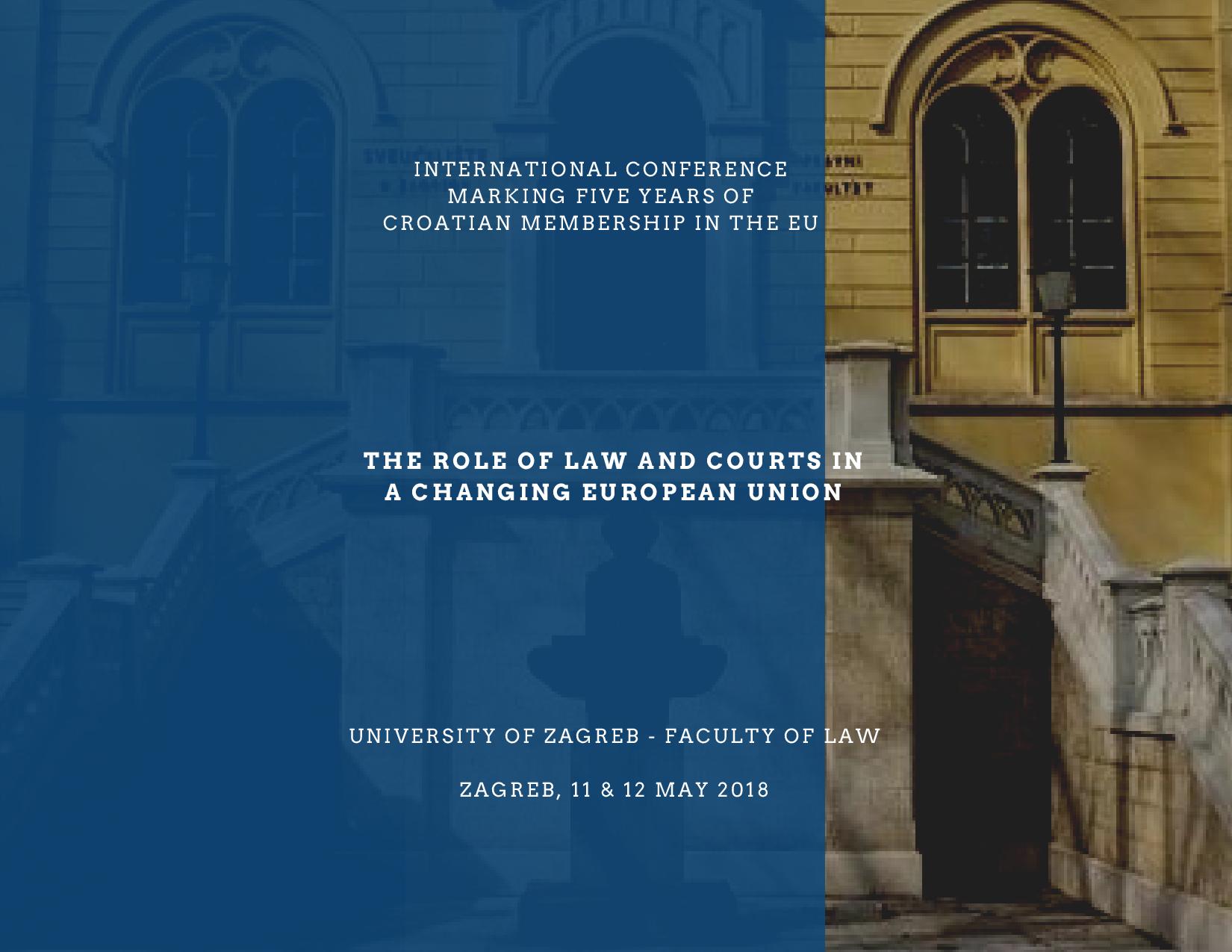
PROGRAMME
International celebratory conference marking five years of Croatian membership in the EU*
THE ROLE OF LAW AND COURTS IN A CHANGING EUROPEAN UNION
Friday, 11 May 2018
Venue: University of Zagreb, Trg Republike Hrvatske 14, Aula (Grand Hall)
09.00 – 9.30 – Opening
Tamara Ćapeta, Jean Monnet Professor, University of Zagreb
Igor Gliha, Dean, University of Zagreb – Faculty of Law
Damir Boras, Rector, University of Zagreb
9.30 – 10.10 – Keynote addresses
Koen Lenaerts, President of the Court of Justice of the EU
Andrej Plenković, Prime Minister of the Republic of Croatia
10.10 – 10.40 – Five Years of Experience and Plans for the Future
Speakers:
Blaženka Divjak, Croatian Minister of Science and Education
Dražen Bošnjaković, Croatian Minister of Justice of Croatia
Moderator:
Tamara Perišin, Jean Monnet Chair, University of Zagreb
10.40 – 11.00 – Coffee break
11.00 – 12.00 – Five Years of Judicial Cooperation
Speakers:
Miroslav Šeparović, President of the Croatian Constitutional Court
Đuro Sessa, President of the Croatian Supreme Court
Siniša Rodin, Judge at the Court of Justice of the EU
Moderator:
Iris Goldner Lang, UNESCO Chair & Jean Monnet Professor, University of Zagreb
12.00 – 12.20 – Book launch: Transformation or Reconstitution of Europe: The Critical Legal Studies Perspective on the Role of Courts in the EU, edited by Perišin, Rodin; authored by Caruso, Ćapeta, Kennedy, Lasser, Lenaerts, Nicola, Perišin, Rodin, Schlag, and Van Malleghem; Hart Publishing, 2018.
12.20 – 13.50 – Catered lunch
* Simultaneous translation (English – Croatian) is provided at the international celebratory conference.
11 & 12 May 2018
Friday, 11 May 2018
Venue: University of Zagreb, Trg Republike Hrvatske 14, Aula (Grand Hall)
13.50 – 15.20 – Panel 1: Judicial Dialogue in a Changing European Union
Moderator:
Tamara Ćapeta, Jean Monnet Professor, University of Zagreb
Speakers:
Koen Lenaerts, President of the Court of Justice of the EU
Monica Claes, University of Maastricht
18.05 – Dinner reception for conference participants hosted by the Croatian Ministry of Foreign and European Affairs (prior registration required)
Venue: Government Premises, Visoka ulica
Saturday, 12 May 2018
Venue: University of Zagreb – Faculty of Law, Ćirilometodska 4, no. VII
8.30 – 10.00 – Panel 2: The New Frontiers of EU Law: Education and Social Rights in a Changing European Union
Moderator:
Catherine Redgwell, Chichele Professor, University of Oxford – TBC
Speakers:
Stephen Weatherill, Jacques Delors Professor, University of Oxford
Tamara Perišin, Jean Monnet Chair, University of Zagreb
Commentators:
Danijela Dolenec, University of Zagreb
Damjan Kukovec, Middlesex School of Law – TBC
10.00 – 10.30 – Coffee break
10.30 – 12.00 – Panel 3: The Role of Judicial Precedents in Migration Policy
Moderator:
Snježana Vasiljević, University of Zagreb
Speakers:
Siniša Rodin, Judge at the Court of Justice of the EU
Iris Goldner Lang, UNESCO Chair & Jean Monnet Professor, University of Zagreb
Commentator:
Sam Koplewicz, Harvard Satter Fellow
12.00 – 13.00 – Catered lunch
13.00 – 14.30 – Panel 4: The Limits of Judicial Interpretation
Moderator:
Melita Carević, University of Zagreb
Speakers:
Alexander Somek, University of Vienna
Tamara Ćapeta, University of Zagreb
Commentator:
Samuel Dahan, Queen’s University, Canada
University of Zagreb – Faculty of Law
Jean Monnet Programme,
Croatian European Union Studies Association,
United States Embassy in Zagreb
CONFERENCE
THE CRITICAL LEGAL STUDIES PERSPECTIVE ON THE ROLE OF COURTS IN THE EUROPEAN UNION:
TRANSFORMATION OR RE-CONSTITUTION OF EUROPE?
Faculty of Law, University of Zagreb, Ćirilometodska 4, classroom no. VII (2nd floor)
26-27 June 2015
Friday, 26 June 2015
9.00 – 10.00 – Meeting with judges of the Croatian Constitutional Court and the Croatian Supreme Court (venue: Constitutional Court)
10.30 – 10.45 – Opening
10.45 – 12.15 – Panel 1
Judge Koen Lenaerts, Vice President, Court of Justice of the EU
Discovering the Law of the EU: The ECJ and the Comparative Law Method
Commentator: Prof. Tamara Perišin, University of Zagreb
12.15 – 12.30 – Coffee break
12.30 – 14.00 – Panel 2
Prof. Michel Lasser, Cornell University
Decoding the European Judicial Appointments Debates Commentator: Prof. Josip Kregar, University of Zagreb
14.00 – 15.30 – Catered lunch
15.30 – 17.00 – Panel 3
Prof. Duncan Kennedy, Harvard University (via video link)
The Role of Courts in Very Imperfect Democracies
Commentator: Prof. Tamara Ćapeta, University of Zagreb
17.15 – 18.00 – Meeting with the Chairpersons of the Croatian Parliament Judiciary Committee and the Constitutional Committee (venue: Croatian Parliament).
18.00 – Buffet dinner at the Croatian Parliament
Saturday, 27 June 2015
9.15 – 10.45 – Panel 4
Judge Siniša Rodin, Court of Justice of the EU
Useful Effect of the European Arrest Warrant
Commentator: Prof. Iris Goldner Lang, University of Zagreb
10.45 – 11.00 – Coffee break
11.00 – 12.30 – Panel 5
Prof. Pierre Schlag, University of Colorado
Creativity in Legal Interpretation
Commentator: Pieter-Augustijn Van Malleghem, Harvard University, University of Leuven
12.30 – 13.00 – Catered lunch
14.00 – 15.30 – Panel 6
Prof. Fernanda Nicola, American University, WCL
Politicization of CJEU Narratives in the Academic Discourse
Commentator: Prof. Zoran Kurelić, University of Zagreb
15.30 – 15.45 – Closing